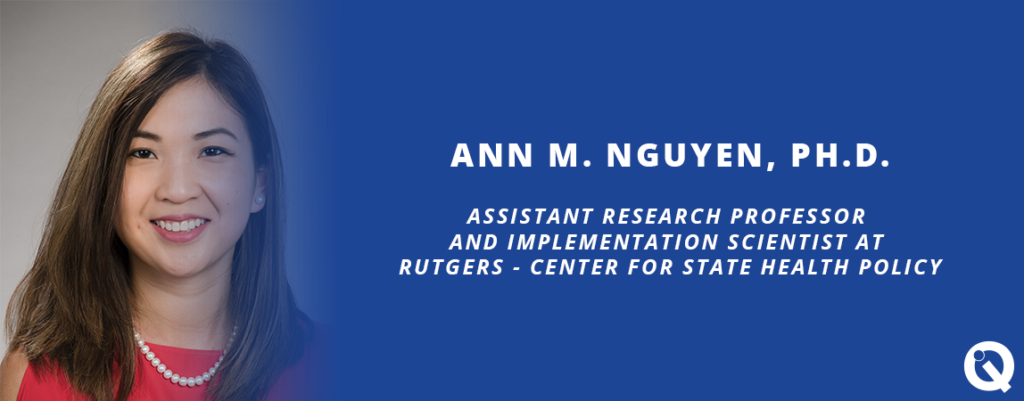Ann M. Nguyen, Ph.D., is an Assistant Research Professor and Implementation Scientist at Rutgers – Center for State Health Policy. Her research focuses on primary care, practice transformation, and workforce. Dr. Nguyen participated in the Quality Institute’s Guidance Document to Recruit, Train, & Retain A Diverse NJ Health Care Workforce.
New Jersey’s COVID-19 Temporary Emergency Reciprocity Licensure (TERL) program provided temporary licenses to more than 31,000 out-of-state health care practitioners during the pandemic. How are you evaluating this program?
My colleagues and I at Rutgers Center for State Health Policy partnered with the New Jersey Division of Consumer Affairs, supported with a grant from the Robert Wood Johnson Foundation, to learn how the program impacted the health care workforce supply. As of January 2021, the Division of Consumer Affairs had issued more than 31,000 temporary licenses – about 27 percent to physicians, 26 percent to mental health providers, 35 percent to nurses and nurse practitioners, and 2 percent to respiratory care therapists. We conducted a survey of the temporary licensees and received about 10,000 responses, which was a pretty good response rate. We do acknowledge some limitations of this study because the subset of practitioners who responded to the survey may be different from the ones who did not.
What did you learn about the diversity of New Jersey’s temporary health care workforce?
From our research which was published in Health Affairs, we learned that health care practitioners came from every state to aid New Jersey. The temporary licensees provided COVID and non-COVID care and conversed with their patients in at least 36 different languages. They primarily used telehealth. Most of our respondents said they are white, non-Hispanic and speak majority English. But, as I mentioned, they spoke over 36 languages, and we had some practitioners who are non-White. Even one or two more health care professionals with a background similar to yours can make a difference to a patient — and to our goal of achieving health equity.
Did temporary licensure increase access for patients during COVID-19
Yes, it did. We estimated that the license-using respondents touched more than 1.4 million lives in New Jersey between March 2020 and January 2021, which is when we conducted the survey. The average number of patients cared for was wide ranging — from 1.4 per month for a mental health provider to up to 408 patients for respiratory care therapists.
Is TERL a program the state needed?
The program was effective. To take a step back, each state maintains its own licensing processes and policies, and it can be difficult to obtain a license in another state. The TERL program waived some of the more stringent regulations that make licensure a long process, including licensure fees and criminal background checks. By relaxing the licensure requirements, practitioners from outside the state were able to quickly and legally care for patients in New Jersey.
With the urgencies of COVID and New Jersey as one of the initial hotspots, the team at the Division of Consumer Affairs did a remarkable job quickly reviewing and issuing more than 30,000 temporary licenses. It takes a whole team to do that. We need more resources to keep thinking about how to ease licensure barriers during a public health emergency so that practitioners from outside of the state who want to help here can cross state lines. We need to be prepared for the next public health emergency.
We like to ask people a question beyond their professional lives. So where might we find you when you are away from work.
I am a Broadway aficionado. I enjoy going to New York to catch the latest play or headlining musical. If anybody ever needs any recommendations, feel free to ask!

